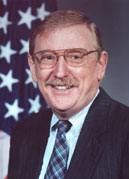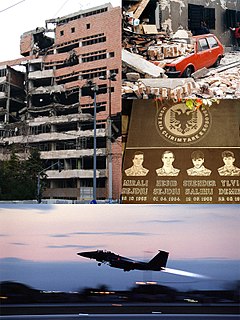
The Kosovo War was an armed conflict in Kosovo that started 28 February 1998 and lasted until 11 June 1999. It was fought by the forces of the Federal Republic of Yugoslavia, which controlled Kosovo before the war, and the Kosovo Albanian rebel group known as the Kosovo Liberation Army (KLA). The conflict ended when the North Atlantic Treaty Organization (NATO) intervened by beginning air strikes in March 1999 which resulted in Yugoslav forces withdrawing from Kosovo.

The Kosovo Liberation Army was an ethnic Albanian separatist militia that sought the separation of Kosovo from the Federal Republic of Yugoslavia (FRY) and Serbia during the 1990s and the eventual creation of Greater Albania due to the presence of a vast ethnic majority of Albanians in the region, stressing Albanian culture, ethnicity and nation. It was considered a terrorist group until the breakup of Yugoslavia.

The Račak massacre or Račak operation was the massacre of 45 Kosovo Albanians that took place in the village of Račak in central Kosovo in January 1999. The massacre was prompted by Albanian separatist activity in the region, and perpetrated by Serbian security forces. The Serbian government refused to let a war crimes prosecutor visit the site, and maintained that the casualties were all members of the rebel Kosovo Liberation Army (KLA) killed in combat with state security forces.

Račak is a village in the Štimlje municipality of Kosovo. It became notorious in January 1999 after at least 45 villagers were killed.
The politics of Kosovo takes place in a framework of a multi-party parliamentary representative democratic republic, whereby the President (Presidenti) is the head of state and the Prime Minister (Kryeministri) the head of government. Parliamentary elections are held every four years, the most recent in 2021.

The Republic of Kosova or First Republic of Kosovo was a self-declared proto-state in southeastern Europe established in 1991. During its peak, it tried to establish its own parallel political institutions in opposition to the institutions of the Autonomous Province of Kosovo and Metohija held by Yugoslavia's Republic of Serbia.
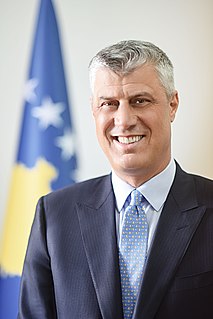
Hashim Thaçi is a Kosovar politician who was the President of Kosovo from April 2016 until his resignation on 5 November 2020. He was the first Prime Minister of Kosovo and the Foreign Minister and Deputy Prime Minister in the new cabinet led by Isa Mustafa, which assumed office on 12 December 2014.
The political status of Kosovo, also known as the Kosovo question, is the subject of a long-running political and territorial dispute between the Serbian government and the Government of Kosovo, stemming from the breakup of Yugoslavia (1991–92) and the ensuing Kosovo War (1998–99). In 1999 the administration of the province was handed on an interim basis to the United Nations under the terms of UNSCR 1244 which ended the Kosovo conflict of that year. That resolution reaffirmed the sovereignty of Serbia over Kosovo but required the UN administration to promote the establishment of 'substantial autonomy and self-government' for Kosovo pending a 'final settlement' for negotiation between the parties.

Lesbian, gay, bisexual, transgender (LGBT) rights in Kosovo have improved in recent years, most notably with the adoption of the new Constitution, banning discrimination based on sexual orientation. However, homosexuality is still viewed by Kosovar society as a taboo topic.

Kosovo unilaterally declared independence from Serbia in 2008, a move which Serbia rejects. Serbia does not recognize Kosovo as an independent state and continues to claim it as the Autonomous Province of Kosovo and Metohija. Initially there were no relations between the two; however, in the following years there has been increased dialogue and cooperation between the two sides.
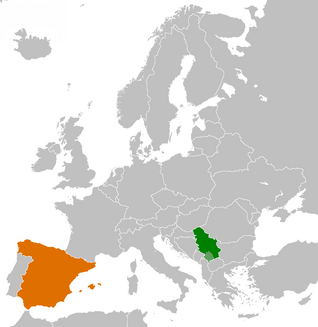
Serbian-Spanish relations are foreign relations between Serbia and Spain. Both countries established diplomatic relations on October 14, 1916. Serbia has an embassy in Madrid. Spain has an embassy in Belgrade. Both countries are member states of the United Nations, Interpol, Council of Europe and Organization for Security and Co-operation in Europe. Spain is member state of the European Union since 1986 and Serbia is a candidate country since 2012 negotiating its future membership which Spain is strongly supporting. Spain is member state of NATO alliance while Serbia is militarily neutral country with strong historical relations with the Non-Aligned Movement.

Relations between Albania and Serbia have been complex and largely hostile due to a number of historical and political events.

The Drenica massacres were a series of killings of Kosovo Albanian civilians committed by Serbian special police forces in the Drenica region of central Kosovo.

A series of war crimes were committed during the Kosovo War. The forces of the Slobodan Milošević regime committed rape, killed many Albanian civilians and expelled them during the war, alongside the widespread destruction of civilian, cultural and religious property. According to the Human Rights Watch, the vast majority of the violations from January 1998 to April 1999 were attributable to Serbian police or the Yugoslav army. Violations also included war crimes committed by the Kosovo Liberation Army, such as kidnappings and summary executions of civilians. In 2014, the Humanitarian Law Center released a list of people killed or went missing during the war, including 8,661 Kosovo Albanian civilians, 1,797 ethnic Serbs and 447 civilians of other ethnicities such as Romani people and Bosniaks.

United Nations Security Council resolution 1160, adopted on 31 March 1998, after noting the situation in Kosovo, the council, acting under Chapter VII of the United Nations Charter, imposed an arms embargo and economic sanctions on the Federal Republic of Yugoslavia, hoping to end the use of excessive force by the government.

United Nations Security Council resolution 1203, adopted on 24 October 1998, after recalling resolutions 1160 (1998) and 1199 (1998) on Kosovo, the Council demanded that the Federal Republic of Yugoslavia comply with previous Security Council resolutions and co-operate with the NATO and Organization for Security and Co-operation in Europe (OSCE) verification missions in Kosovo.
Gabriel Keller is a French diplomat and teacher. Keller earned a history professor agrégé degree in 1972 at Paris West University Nanterre La Défense.
The Kosovo Verification Mission (KVM) was an OSCE mission to verify that the Serbian, and Yugoslav forces were complying with the UN October Agreement to end atrocities in Kosovo, withdraw armed forces from Kosovo, and abide by a ceasefire.
The Staro Gracko massacre was the mass killing of 14 Kosovo Serb farmers in the village of Staro Gracko in the Kosovo municipality of Lipljan on 23 July 1999. The killings occurred after Yugoslav troops withdrew from the region in the aftermath of the Kosovo War, and was the worst single crime in Kosovo since the conflict ended in June 1999. The perpetrators of the killings have never been captured.
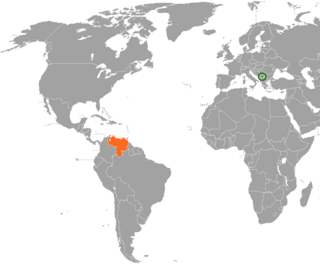
Kosovo–Venezuela relations are foreign relations between Kosovo and Venezuela.
